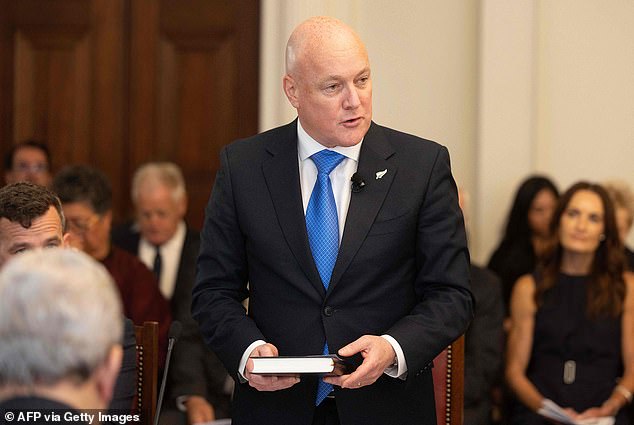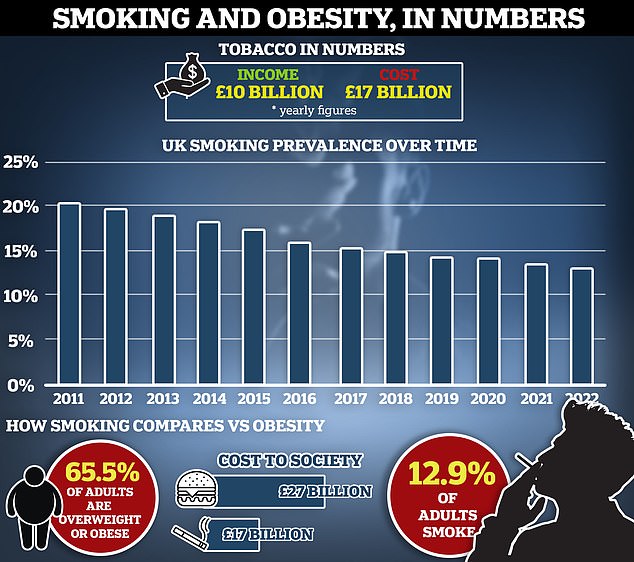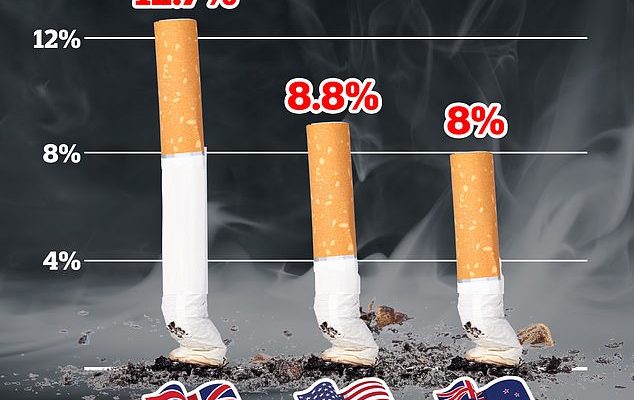Plans by New Zealand’s new government to ditch its world-first smoking ban were today attacked by health experts.
The move, to stop children from taking up the habit, was initially introduced by ex-Prime Minister Jacinda Ardern in 2022. Once implemented next year, anyone born after 2008 would have been banned from ever buying cigarettes.
New Zealand’s new prime minister, Christopher Luxon, said the U-turn would fund tax cuts.
But public health experts said the reversal was ‘extremely concerning’, warning the move would cost thousands of lives.
Deborah Arnott, chief executive of Action on Smoking and Health (ASH), called it a ‘purely political decision’.
It comes as a the Organisation for Economic Co-operation and Development 2023 health report showed 12.7 per cent of Brits over the age of 15 smoke cigarettes daily, far higher than the US and New Zealand, the latter of which recently introduced a similar phased smoking ban

The move was initially introduced by then-Prime Minister Jacinda Ardern in 2022, and once implemented in July 2024, would have seen anyone born after January 2009 banned from buying cigarettes. But V=vocal nay-sayers — including the nation’s new Prime Minister Chris Luxon (pictured) — had already argued a ban would lead to a black market for tobacco
She said: ‘Repealing the smoke-free generation policy is purely a political decision by New Zealand’s National Party in order to secure the handful of votes it needs from a libertarian party to form a government.
‘The idea that that by doing so it could fund tax cuts is ludicrous.
‘In the UK, analysis shows smoking costs public finances nearly double tobacco tax revenues, so there’s no way that repealing the legislation can fund tax cuts.’
Rishi Sunak will press ahead with a UK smoking ban, despite the original prohibition inspiring his radical idea now being scrapped in New Zealand.
If passed, it would annually raise the age at which people can purchase tobacco by one year, putting legal smoking out of reach of anyone aged under 14 today.
A No10 spokesman said: ‘The PM still thinks it is important to have the first smoke-free generation.’
They added that Mr Sunak is ‘not doing this to take the easy route or because other countries are doing it’, saying: ‘He thinks it is the right thing to do for the health of our young people.’
When he formally announced the bold proposal last month, Mr Sunak faced criticism from some vocal nay-sayers, including former PM Liz Truss and ex-UKIP leader Nigel Farage.
Former PM Boris Johnson also slammed the ‘barmy’ proposals last month, calling it a ‘smoking apartheid’.
The Government, however, wielded stats showing how smoking costs the economy £17bn a year through lost productivity and knock-on effects to the NHS.
For comparison, tobacco duties generate around £10billion annually.
New Zealand’s incoming finance minister Nicola Willis said the plan, part of a wider string of anti-smoking measures, would have lost about $1bn (480m) in revenue.
Mr Luxon, a 53-year-old former businessman, leads a conservative coalition after his National Party struck a deal with two smaller parties following a general election last month.
Luxon said the cigarette ban would create ‘an opportunity for a black market to emerge, which would be largely untaxed’.
Discussing the U-turn, Professor Richard Edwards, a public health expert at the University of Otago, told the BBC: ‘We are appalled and disgusted, this is an incredibly retrograde step on world-leading, absolutely excellent health measures.’
He added: ‘Most health groups in New Zealand are appalled by what the government’s done and are calling on them to backtrack.’
Under the proposals, the legal amount of nicotine in tobacco products would have been dramatically reduced and their sale allowed only through special tobacco stores.
The number of stores legally allowed to sell cigarettes would also have been slashed from 6,000 to just 600 nationwide.
The legislation passed last year had been acclaimed internationally with research backing the key reforms. Modelling had also suggested it could save up to 5,000 lives each year.
Professor Caitlin Notley, a professor of addiction sciences at the University of East Anglia, today branded the U-turn ‘dangerous’, adding: ‘It is extremely concerning that a complete about-turn to the progressive approach to eradicating tobacco smoking in New Zealand is now being proposed.
‘This sends a dangerous message that preventing tobacco smoking — the leading cause of early death and disease — is not a priority.
‘The world had looked to the previous New Zealand government as global leaders in bold proposals that would accelerate the country towards a future free of tobacco smoking.’
She added: ‘The sudden shift away from the previously proposed ‘tobacco endgame’ policies therefore will undoubtedly further widen health inequalities between Māori and non-Māori populations.’
Meanwhile, Professor Jamie Brown, director of the Tobacco and Alcohol Research Group at University College London, said: ‘It’s extremely disappointing that they are to be scrapped to fund tax cuts.
‘Apart from the moral imperative to reduce avoidable deaths, the measures would likely also have saved more money in the long-term from reduced healthcare and improved productivity.
‘New Zealand and the UK were set to lead the world in tobacco control — hopefully other countries will learn from the contrasting trajectories that smoking prevalence will likely now follow in the two countries.’

Dr Sarah Jackson, principal research fellow in the UCL Tobacco and Alcohol Research Group, also said: ‘The New Zealand government’s decision to overturn its bold tobacco control legislation does not appear to have been made with public health in mind.
‘Modelling from New Zealand suggests the legislation would have seen smoking rates fall below 5 per cent by 2025, which would be a major milestone. It also had the potential to substantially reduce health inequalities in New Zealand.
‘Smoking rates are much higher in the indigenous Māori population and this is a key driver of poorer health outcomes.’
Despite praise as a public health policy, the initial measures, however, had drawn strict opposition from some business groups in New Zealand.
Owners of newsagents and corner shops criticised the loss of revenue, despite government subsidies.
Christopher Snowdon, head of lifestyle economics at the Institute of Economic Affairs think-tank, which previously branded Mr Sunak’s plan an attack on people’s liberties, also claimed the policy was ‘doomed to failure’.
He said: ‘The eccentric idea of a generational smoking ban is doomed to failure.
‘It is an unworkable pipe dream that will only enrich tobacco smugglers and erode respect for the law while doing little to reduce smoking.
‘The Kiwi U-turn comes just weeks after the Malaysian government abandoned a similar policy because age discrimination is unconstitutional.
‘Prime Minster Rishi Sunak now stands alone in the world, carrying the torch of a policy dreamt up by Jacinda Ardern at the fag end of a Labour government on the other side of the world.’
Under UK proposals outlined in the Kings Speech earlier this month, kids born after 2009 will never legally be able to buy tobacco.
Funding packages of up to £140million to support people quitting smoking will also be made available from April.
The Government believes that, if enacted, the phased ban will lead to 1.7million fewer people smoking by 2075 — saving tens of thousands of lives, and avoiding avoid up to 115,000 cases of strokes, heart disease, lung cancer and other lung diseases.
Mr Sunak also insisted that smoking will not be criminalised, suggesting that Brits subject to the ban won’t be fined for buying them abroad.
At the time, experts and charities all commended the move, described as the ‘biggest public health intervention in a generation’.
The approach was initially recommended in a Government-commissioned report last year by ex-children’s charity chief Javed Khan.
He was tasked with finding ways England could be smoke-free by 2030 — defined as less than five per cent of people smoking.
He warned that that without urgent action, England would miss the 2030 ‘smoke-free’ target by at least seven years, with the poorest areas not meeting it until 2044.
Smoking rates in the UK are now the lowest on record, at 12.9 per cent — or around 6.4million people.
But smoking kills around 78,000 people in the UK every year, with many more living with illnesses due to their habit — half of which are due to cardiovascular diseases, such as heart attack and stroke.
It is estimated that around 500,000 hospital admissions every year in England are attributable to smoking and that smoking costs the economy £17billion per year.
Of this, £2.4billion falls on the NHS, £1.19billion falls on the social care system, and over £13billion is lost in productivity costs from tobacco-related lost earnings, unemployment and premature death.
The 7,000 chemicals in tobacco — including tar and others that can narrow arteries and damage blood vessels — are thought to be behind some of the damage smoking inflicts on the heart.
Meanwhile, nicotine — a highly addictive toxin found in tobacco — is heavily linked with dangerous increases in heart rate and blood pressure.
Smoking also unleashes poisonous gases such as carbon monoxide, which replaces oxygen in the blood — reducing the availability of oxygen for the heart.

